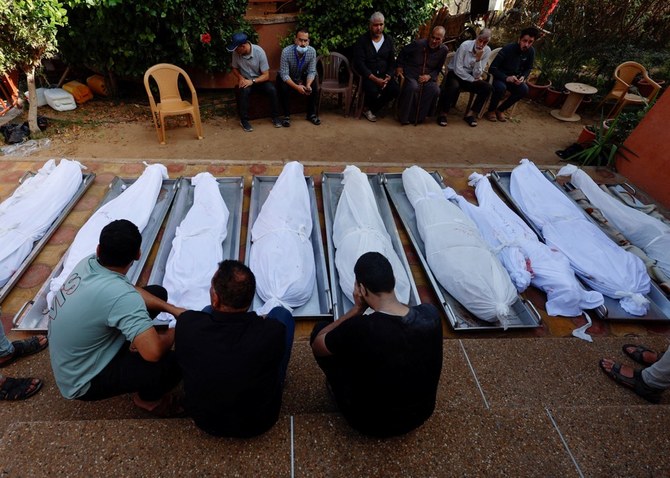
- ARAB NEWS
- 04 Jul 2025

One thing is for sure: as Benjamin Netanyahu said after the Hamas attacks on Oct. 7, Israel’s response “will change the Middle East”— perhaps the only words of wisdom the Israeli prime minister has uttered since this crisis began.
Indeed, the first change may be in the occupant of his office. Polls show Netanyahu’s personal approval rating having slumped to 27 percent, there are protests outside his home over what Israelis overwhelmingly view as a security lapse on his watch, and a raft of media opinion pieces hold him personally responsible — as Haaretz put it: “The disaster that befell Israel … is the clear responsibility of one person: Benjamin Netanyahu.”
Second, as previously predicted in this column, the Hamas leaders who declared victory on Oct. 7 and thought that by holding hostages they could negotiate better terms have now put the world in a situation where it needs to negotiate only limits to the Israeli reaction — which, after long years of experience and five wars since 2006, Hamas should have known was never going to be proportionate.
This is not to say that Israel’s ongoing occupation of Palestinian land and the continuing undermining of Palestinian rights is not to blame for the escalation to where we are today — but rather that whatever strategic gain Hamas wildly imagined it would achieve is not materializing.
In other words, no matter how this ends, the current leaderships of both Hamas and Israel are finished — a fitting end for a couple who have for so long been unlikely tag-team partners in their unwavering commitment to killing any prospect of peace.
“For years, Netanyahu propped up Hamas. Now it’s blown up in our faces,” read a headline in The Times of Israel.
Faisal J. Abbas
In fact, Netanyahu — who could be described as the Francis Underwood of Israeli politics — has not only survived this far but has become his country’s longest-serving prime minister by deploying one simple tactic: avoiding any serious engagement with resolving the Palestinian issue, and doing anything possible to undermine a solution for it.
This has unbelievably included going as low as empowering his sworn enemy Hamas in Gaza, and undermining the Palestinian Authority in the West Bank, where Hamas doesn’t exist.
But don’t just take my word for it. “For years, Netanyahu propped up Hamas. Now it’s blown up in our faces,” read a headline in The Times of Israel. Worse, as recently as 2019 Netanyahu reportedly said: “Those who want to thwart the establishment of a Palestinian state should support the strengthening of Hamas.”
However, even a serial survivor like Francis Underwood eventually runs out of luck: everything collapses like a house of cards when you upset 80 percent of your voters, members of your own Cabinet, and the 121 countries who opposed Israel at the UN last month, albeit in a non-binding vote — all that plus still outstanding corruption charges that mean when Netanyahu leaves office his next destination may well be a prison cell.
Hamas, on the other hand, has a different equation. Even if Israel succeeds in its impossible mission of killing all the group’s estimated 40,000 fighters, or expelling them and their leaders from Gaza (while completely disregarding legal, humanitarian and political consequences) they will have “killed only the combatants but not the cause” — as Queen Rania of Jordan told Becky Anderson in her CNN interview.
Even if Israel succeeds in its impossible mission of killing all the group’s estimated 40,000 fighters, they will have “killed only the combatants but not the cause” — as Queen Rania of Jordan told CNN.
Faisal J. Abbas
So, are there any winners? Well, apart from extremists finding justification in the current events to attack mosques and synagogues; there is a hopeful argument that the intensity, severe casualties and ugliness of this war — and its already global ramifications — will now force the international community to accept that no more patch-up solutions are possible. The only way to ensure this doesn’t happen again is finally to have a just and fair peace that gives Palestinians land, freedom and hope. As argued here before, now is the time to double down on peacemaking efforts, and this starts with ending the illegal occupation — a hard ask given that the only country with genuine influence over Israel has vetoed even a ceasefire.
Indeed, as if we did not know this before, when the current US government shamelessly supports an occupying power that has killed more than 10,000 Palestinians in Gaza, many of them children, it no longer holds the moral high ground to preach to others about not doing enough to condemn Russia’s invasion of Ukraine.
In the end, no one put it better than UN Secretary-General Antonio Guterres when he said:
“The nightmare in Gaza is more than a humanitarian crisis. It is a crisis of humanity.”
• Faisal J. Abbas is the editor-in-chief of Arab News.
X: @FaisalJAbbas